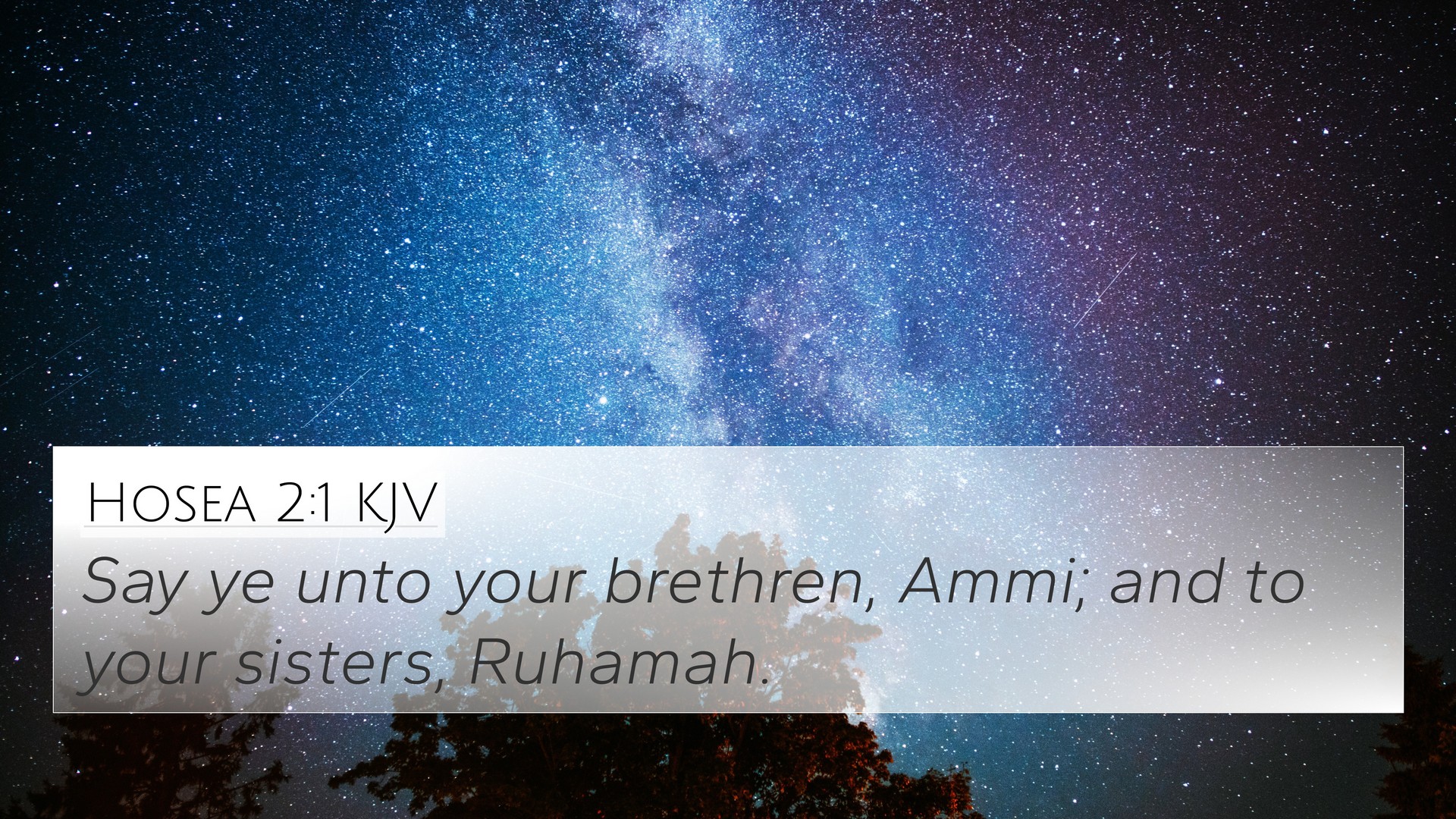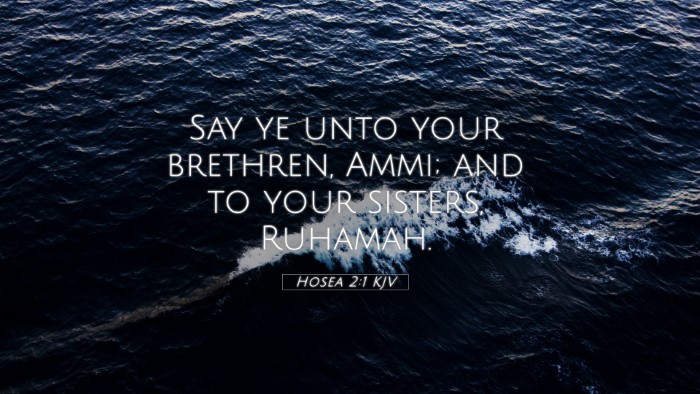Old Testament
Genesis Exodus Leviticus Numbers Deuteronomy Joshua Judges Ruth 1 Samuel 2 Samuel 1 Kings 2 Kings 1 Chronicles 2 Chronicles Ezra Nehemiah Esther Job Psalms Proverbs Ecclesiastes Song of Solomon Isaiah Jeremiah Lamentations Ezekiel Daniel Hosea Joel Amos Obadiah Jonah Micah Nahum Habakkuk Zephaniah Haggai Zechariah MalachiHosea 2:1 Similar Verses
Hosea 2:1 Cross References
Say ye unto your brethren, Ammi; and to your sisters, Ruhamah.
Uncover the Rich Themes and Topics of This Bible Verse
Listed below are the Bible themes associated with Hosea 2:1. We invite you to explore each theme to gain deeper insights into the Scriptures.
Hosea 2:1 Cross Reference Verses
This section features a detailed cross-reference designed to enrich your understanding of the Scriptures. Below, you will find carefully selected verses that echo the themes and teachings related to Hosea 2:1 KJV. Click on any image to explore detailed analyses of related Bible verses and uncover deeper theological insights.
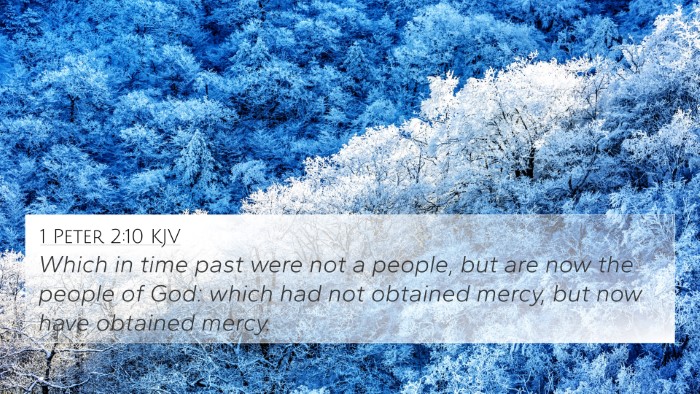
1 Peter 2:10 (KJV) »
Which in time past were not a people, but are now the people of God: which had not obtained mercy, but now have obtained mercy.
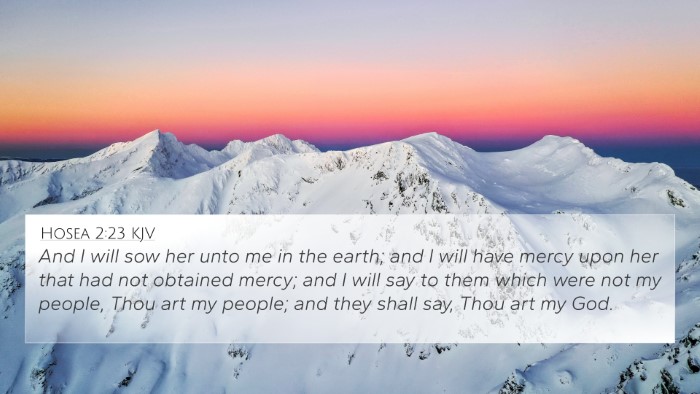
Hosea 2:23 (KJV) »
And I will sow her unto me in the earth; and I will have mercy upon her that had not obtained mercy; and I will say to them which were not my people, Thou art my people; and they shall say, Thou art my God.
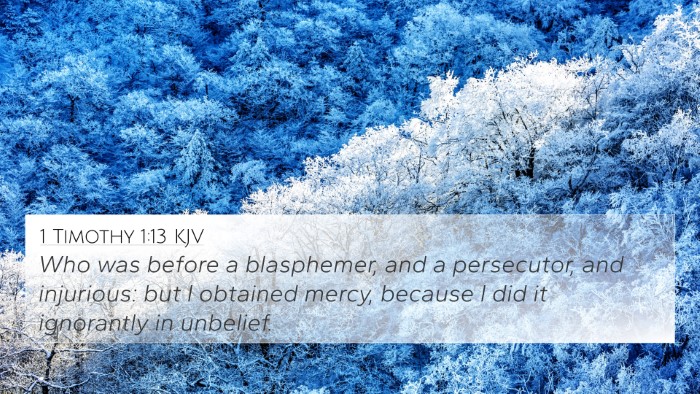
1 Timothy 1:13 (KJV) »
Who was before a blasphemer, and a persecutor, and injurious: but I obtained mercy, because I did it ignorantly in unbelief.
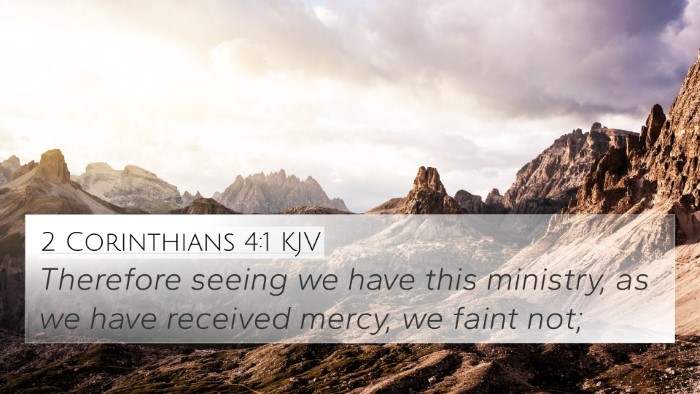
2 Corinthians 4:1 (KJV) »
Therefore seeing we have this ministry, as we have received mercy, we faint not;
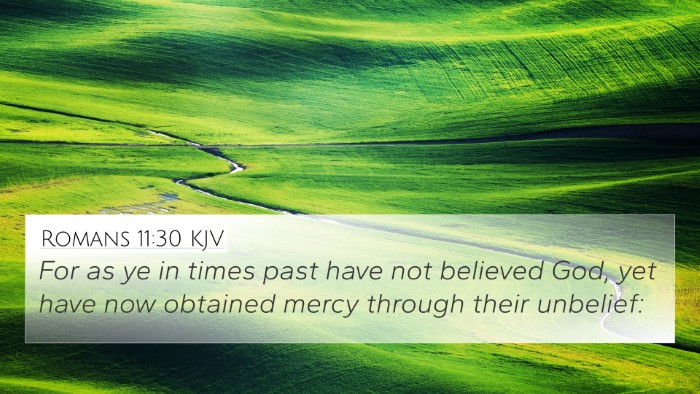
Romans 11:30 (KJV) »
For as ye in times past have not believed God, yet have now obtained mercy through their unbelief:
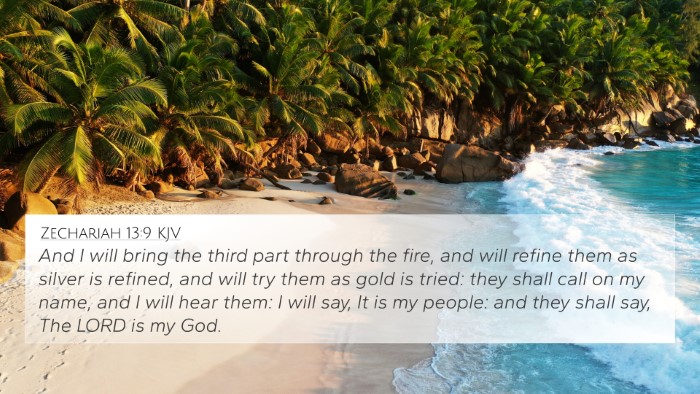
Zechariah 13:9 (KJV) »
And I will bring the third part through the fire, and will refine them as silver is refined, and will try them as gold is tried: they shall call on my name, and I will hear them: I will say, It is my people: and they shall say, The LORD is my God.
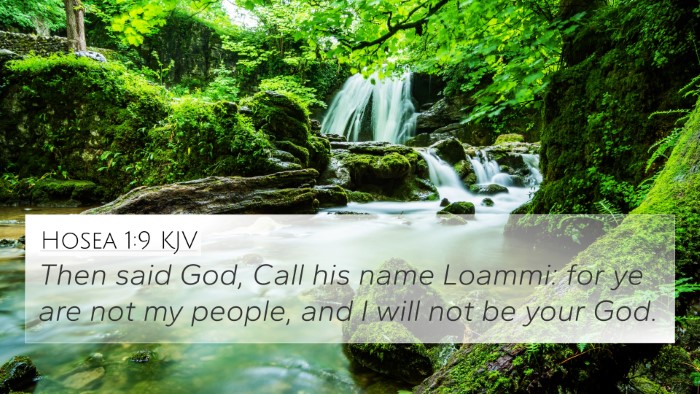
Hosea 1:9 (KJV) »
Then said God, Call his name Loammi: for ye are not my people, and I will not be your God.
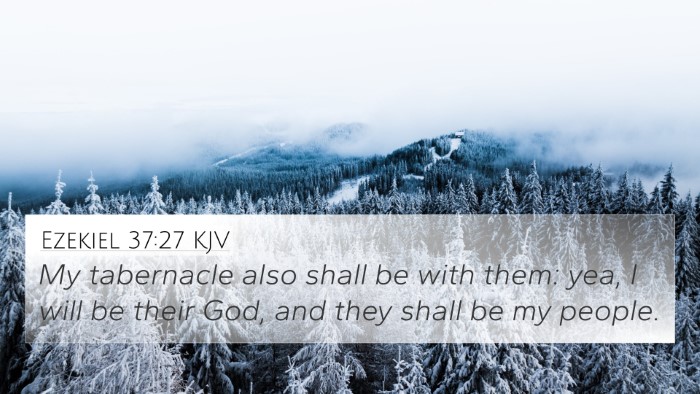
Ezekiel 37:27 (KJV) »
My tabernacle also shall be with them: yea, I will be their God, and they shall be my people.
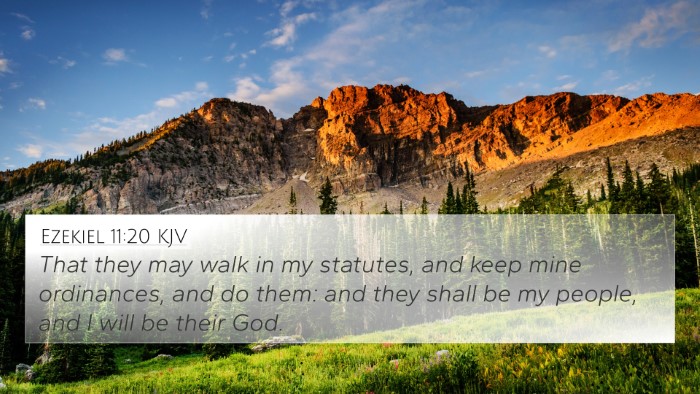
Ezekiel 11:20 (KJV) »
That they may walk in my statutes, and keep mine ordinances, and do them: and they shall be my people, and I will be their God.
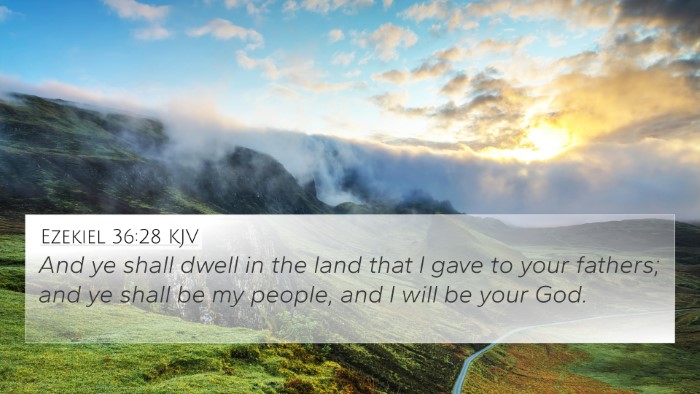
Ezekiel 36:28 (KJV) »
And ye shall dwell in the land that I gave to your fathers; and ye shall be my people, and I will be your God.
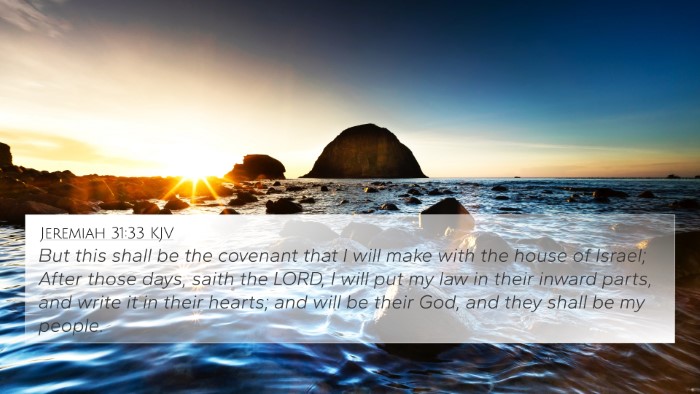
Jeremiah 31:33 (KJV) »
But this shall be the covenant that I will make with the house of Israel; After those days, saith the LORD, I will put my law in their inward parts, and write it in their hearts; and will be their God, and they shall be my people.
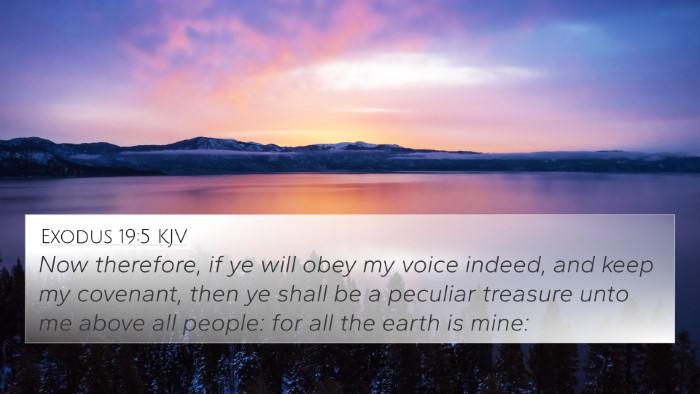
Exodus 19:5 (KJV) »
Now therefore, if ye will obey my voice indeed, and keep my covenant, then ye shall be a peculiar treasure unto me above all people: for all the earth is mine:
Hosea 2:1 Verse Analysis and Similar Verses
Understanding Hosea 2:1
Bible Verse: Hosea 2:1
“Say ye unto your brethren, Ammi; and to your sisters, Ru-hamah.”
Contextual Background
The Book of Hosea primarily addresses Israel's rebellion against God, symbolized through the prophet's tumultuous marriage. Having personally experienced betrayal, Hosea communicates God's longing for His people who are likened to an unfaithful spouse.
Commentary Insights
- Matthew Henry: Henry emphasizes the significance of this verse as an address to the people of Israel, signifying their identity as God's chosen ones, asserting that despite their unfaithfulness, they still hold the potential for restoration and redemption.
- Albert Barnes: Barnes interprets "Ammi" and "Ru-hamah" as symbols of God’s relationship with His people, noting that "Ammi" means "My People" and "Ru-hamah" signifies "She has obtained mercy," illustrating the dual themes of identity and mercy that resonate throughout Scripture.
- Adam Clarke: Clarke highlights the familial terms used here, suggesting that they indicate the deep relational bond between God and Israel, reminiscent of language used in the New Testament, thereby indicating a continuity in God's redemptive plan.
Thematic Bible Verse Connections
This verse can be linked with several passages that illustrate the themes of identity, mercy, and restoration:
- 1 Peter 2:10: "Which in time past were not a people, but are now the people of God: which had not obtained mercy, but now have obtained mercy." - This echoes the notion of transformation from a state of desolation to one of acceptance.
- Romans 9:25-26: "As he saith also in Osee, I will call them my people, which were not my people; and her beloved, which was not beloved." - A direct reference to the same themes expressed in Hosea.
- Ephesians 2:13: "But now in Christ Jesus ye who sometimes were far off are made nigh by the blood of Christ." - Illustrating the personal aspect of God's reconciliation with humanity.
- Isaiah 43:1: "But now thus saith the LORD that created thee, O Jacob, and he that formed thee, O Israel, Fear not: for I have redeemed thee, I have called thee by thy name; thou art mine." - Emphasizing God’s claim over His people.
- Luke 15:24: "For this my son was dead, and is alive again; he was lost, and is found. And they began to be merry." - This New Testament passage reinforces the theme of lost and found, paralleling Israel's restoration.
- Jeremiah 31:20: "Is Ephraim my dear son? is he a pleasant child? for since I spake against him, I do earnestly remember him still: therefore my bowels are troubled for him; I will surely have mercy upon him, saith the LORD." - God's enduring compassion for His people is reiterated here.
- Zechariah 10:6: "And I will strengthen the house of Judah, and I will save the house of Joseph, and I will bring them again to place them; for I have mercy upon them." - Demonstrating the hope of restoration.
Cross-Referencing Biblical Texts
Understanding Hosea 2:1 benefits greatly from cross-referencing Bible study. By connecting it with other scriptures, one can gain deeper insights into its meaning:
- Connection to the Gospels: The calling of the lost can be correlated with the parables of Jesus, especially in how He calls the unworthy to Himself.
- Prophetic Parallels: This theme of restoration can also be cross-referenced through the works of Isaiah and Jeremiah, where themes of forgiveness and return to God are prevalent.
- Inter-Biblical Dialogue: The relationship between the Old Testament promises and New Testament fulfillment can be a rich field for study, illustrating the continuity of God’s redemptive work through Christ.
Tools for Bible Cross-Referencing
To further enhance your study of Hosea 2:1, consider utilizing resources like:
- Bible Concordance
- Bible Cross-Reference Guide
- Cross-Reference Bible Study Tools
- Bible Reference Resources
Conclusion
Hosea 2:1 serves as a pivotal reminder of God's enduring mercy and commitment to His people, even in the face of unfaithfulness. Through a combination of texts and themes, one can appreciate the depth of God's message contained within this poignant verse.
